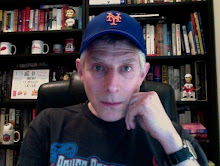Memory is a funny thing. Collective memory even more so. Bigger events often overwhelm their smaller, yet significant, antecedents. And so it was that the Major League Baseball job action that destroyed the entirety of the 1994 season came to eclipse the previously unprecedented strike of 1981.
 |
| The Late Summer Classic |
Free agency was a mere five seasons old. Owners tiring of losing top stars for no return whatsoever demanded some form of compensation. The players' union, sensing a backdoor means of impeding their hard won player movement, refused to go along.
On June 12, 1981, they walked out. Baseball's cathedrals went dark, empty and unused, while standings and stats sat frozen in time.
Billy Martin's Oakland A's led the American League West, the New York Yankees characteristically ruled the A.L. East. Their National League nemeses, the Los Angeles Dodgers, aided by the brilliant rookie left-hander Fernando Valenzuela, ruled the West, while the defending champion Phillies sat atop the East. And sat. And sat. And sat.
The All Star Game, set for July 14 in Cleveland was postponed indefinitely and still the parties remained at loggerheads. More than seven hundred games went unplayed before peace prevailed on July 31, with a limited form of compensation for loss of upper-echelon players.
Those four teams in first place when the walkout began were declared first-half winners, the won-loss records were reset to 0-0 for an unprecedented second-half. But where to begin?
Cleveland, site of the All Star game now rescheduled for Aug. 9, with the regular season to resume the next day.
Team rosters were stocked with players worthy of the contest.
The N.L.'s starting nine featured three future members of the National Baseball Hall of Fame: Philly's Mike Schmidt at third base, the Montreal Expos' outfielder Andre Dawson and catcher Gary Carter, plus baseball's all-time hits leader, Pete Rose. Among the senior circuit reserves, hall inductees Nolan Ryan, Tom Seaver and Bruce Sutter.
The A.L. lineup was just as good, boasting Boston Red Sox catcher Carlton Fisk, California Angels' first baseman Rod Carew, Royals third baseman George Brett and Yankees outfielders Reggie Jackson and Dave Winfield, backed by Hall members Eddie Murray, Rollie Fingers and others.
A nip-and-tuck affair, the game saw the A.L. lose leads of 1-0 and 4-2 before succumbing 5-4 before more than 72,000 fans at the antiquated, cavernous Cleveland Municipal Stadium.
Carter blasted two homers, but Schmidt's two-run shot off Fingers proved to be the game winner. The Baltimore Orioles' Ken Singleton had the lone junior circuit clout. Fingers took the loss. The San Francisco Giants' Vida Blue got credit for the win and Sutter, then toiling for the St. Louis Cardinals got the save.
Baseball was back. Sort of. The split season's second half would bear hope, heartbreak, injustice and -- unlike the catastrophic events of 1994 -- at least a championship.
Those four teams in first place when the walkout began were declared first-half winners, the won-loss records were reset to 0-0 for an unprecedented second-half. But where to begin?
Cleveland, site of the All Star game now rescheduled for Aug. 9, with the regular season to resume the next day.
Team rosters were stocked with players worthy of the contest.
The N.L.'s starting nine featured three future members of the National Baseball Hall of Fame: Philly's Mike Schmidt at third base, the Montreal Expos' outfielder Andre Dawson and catcher Gary Carter, plus baseball's all-time hits leader, Pete Rose. Among the senior circuit reserves, hall inductees Nolan Ryan, Tom Seaver and Bruce Sutter.
 |
| Some of those on the NL ballot... |
 |
| ... and their AL counterparts. |
The A.L. lineup was just as good, boasting Boston Red Sox catcher Carlton Fisk, California Angels' first baseman Rod Carew, Royals third baseman George Brett and Yankees outfielders Reggie Jackson and Dave Winfield, backed by Hall members Eddie Murray, Rollie Fingers and others.
A nip-and-tuck affair, the game saw the A.L. lose leads of 1-0 and 4-2 before succumbing 5-4 before more than 72,000 fans at the antiquated, cavernous Cleveland Municipal Stadium.
Carter blasted two homers, but Schmidt's two-run shot off Fingers proved to be the game winner. The Baltimore Orioles' Ken Singleton had the lone junior circuit clout. Fingers took the loss. The San Francisco Giants' Vida Blue got credit for the win and Sutter, then toiling for the St. Louis Cardinals got the save.
Baseball was back. Sort of. The split season's second half would bear hope, heartbreak, injustice and -- unlike the catastrophic events of 1994 -- at least a championship.
-- Follow me on Twitter @paperboyarchive

No comments:
Post a Comment